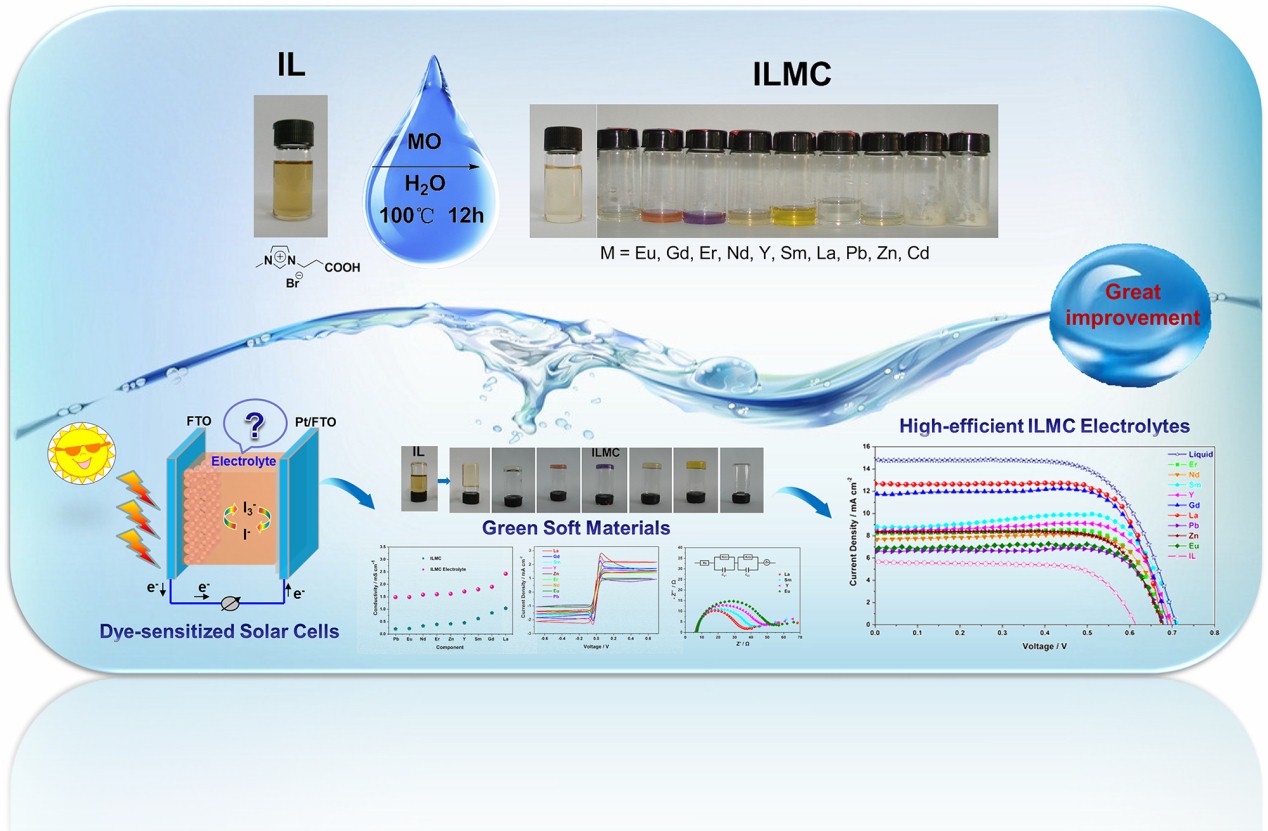In order to solve the problem of energy and environmental pollution, solar cells as one kind of efficient utilization of solar energy, have become especially important. Dye-sensitized solar cells (DSCs) have attracted significant attention as the low-cost alternatives to commercial solar cells. However, the volatilization feature of traditional high-efficient liquid electrolytes resulting in decreased efficiency and unsatisfactory stability performance. This limits the further practical application. Therefore, it’s necessary to develop alternative electrolytes.
Solvent-free room temperature ionic liquid-based electrolytes have exhibited attractive photovoltaic performance due to their excellent physicochemical properties. However, the present efficiency is restricted and unsatisfactory compared with liquid one due to the limited types of traditional ILs, the low conductivity and high viscosity. In addition, some ILs with complex procedures and expensive starting materials hinder the further development and application. As a consequence, it remains a great challenge to develop new families of IL-based electrolytes with high conductivities and superior photovoltaic performances.
Recently, researchers developed a new series of soft materials based on ionic liquid-metal complexes (ILMCs) with different metal centers by a simple coordination synthetic method. The obtained complexes as efficient electrolytes of DSCs exhibited superior photovoltaic performance and the remarkable increased conversion efficiencies with a multiple of 1.46-2.63 compared with the IL electrolyte without metal center. The conversion efficiencies up to 6.38% were achieved based on ILMC electrolytes without any purification, which is comparable to the value of traditional liquid electrolyte. The mechanism investigations clarified the influences of different metal centers on the conversion efficiencies of corresponding devices. The high conductivity and diffusion coefficient of I3- suppressed electron recombination, as well as low charge transfer impedance contribute to the superior photovoltaic performance of the devices. The advantages of simple composition, high conductivity, superior conversion efficiency along with easy fabrication method qualify the developed ILMC-based soft materials as promising high-efficient alternative electrolytes of DSCs. The findings presented in this work will provide an effective way for designing new types of electrolytes towards high-efficient DSCs.

The research team was led by Prof. ZHANG Suojiang from the State Key Laboratory of Multiphase Complex System of Institute of Process Engineering (IPE), Chinese Academy of Sciences (CAS). The research was supported by the National Natural Science Foundation of China (Grant No. 51203161), the State Key Program of National Natural Science Foundation of China (Grant No. 21436010), the Major Research plan of the National Natural Science Foundation of China (Grant No. 91434203) and the Key Laboratory of Green Process and Engineering, Chinese Academy of Sciences.
The related previous work has been published in Chem. Commun.( 2013, 49, 6980-6982). The following work entitled “ New series of soft materials based on ionic liquid–metal complexes for high-efficient electrolytes of dye- sensitized solar cells” has been published in J. Mater. Chem. A, 2017, 5, 14630–14638.
Author Contact:
Prof. ZHANG Suojiang
State Key Laboratory of Multiphase Complex System, Institute of Process Engineering, Chinese Academy of Sciences,
Beijing 100190, P. R. China.
E-mail: sjzhang@ipe.ac.cn
Medica Contact:
Ms. YUAN Pei
International Cooperation Office, Institute of Process Engineering, Chinese Academy of Sciences, Beijing 100190, P.
R. China.
E-mail: pyuan@ipe.ac.cn
 Search
Search




 京公网安备110402500047号
京公网安备110402500047号